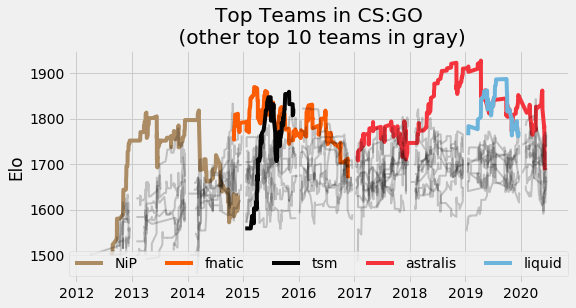BJY Trends
Stay updated with the latest trends and insights.
Proving Grounds: The Unsung Heroes Behind CSGO Team Rankings
Discover the untold stories of the players driving CSGO team rankings and find out who the real heroes are behind the scenes!
The Untold Stories: How Coaches and Analysts Shape CSGO Team Rankings
The world of CSGO is not just about players and their skills; it is also significantly influenced by the behind-the-scenes work of coaches and analysts. These unsung heroes dedicate countless hours analyzing gameplay, dissecting strategies, and providing insights that shape team dynamics and overall performance. For instance, coaches often implement training regimens tailored to enhance individual strengths, while analysts study opponent tendencies using advanced statistics to prepare their teams. The meticulous approach taken by these professionals can drastically alter a team’s ranking, making their contributions essential yet often overlooked.
Furthermore, the impact of coaches and analysts can be vividly seen during major tournaments where fine margins determine winning or losing. Analysts provide pre-match briefings that can dictate how a team approaches their game strategy, and in-game coaches facilitate real-time decision-making that can shift the tide of a match. The intricate relationship between team rankings and coaching strategies reveals that success in CSGO is not solely about mechanical skill but also about the intelligence behind every move. As fans, recognizing these untold stories allows us to appreciate the complexity of the competitive scene and the crucial roles these professionals play.

Counter-Strike is a highly popular multiplayer first-person shooter game that has become a staple in the esports community. Players are divided into teams, typically terrorists and counter-terrorists, and they compete to complete objectives or eliminate the opposing team. One of the essential skills in the game is mastering movement and shooting techniques. For example, players often use a jump throw bind to improve their grenade throwing accuracy.
Beyond the Players: Exploring the Roles of Support Staff in Competitive CSGO
In the highly competitive world of CSGO, much attention is often directed toward the players who make headlines with their exceptional skills and gameplay. However, it is essential to recognize the pivotal role that support staff plays behind the scenes. These individuals, including coaches, analysts, and psychologists, contribute significantly to a team's overall performance. Coaches guide players through strategic development, while analysts assess opponents' tactics to formulate counter-strategies. Together, they ensure that players are not only technically proficient but also mentally prepared for the challenges they face in high-stakes matches.
Moreover, the support staff in competitive CSGO also encompasses roles such as team managers and nutritionists. Team managers handle logistics, scheduling, and communication, ensuring that players can focus on honing their skills without any external distractions. Meanwhile, nutritionists play a critical role in maintaining players' health and energy levels, optimizing their performance during intense competitions. As CSGO continues to evolve, the importance of these behind-the-scenes contributors cannot be overstated, making their roles just as vital to a team's success as those of the players themselves.
What Factors Influence CSGO Team Rankings Beyond Player Skill?
While player skill is undeniably a crucial component in the CSGO team rankings, several other factors play a significant role in determining a team's overall standing. Team chemistry is one such factor, which refers to the synergy and collaborative dynamics among team members. A team with well-established communication and trust will often perform better under pressure, translating that cohesive energy into effective gameplay. Additionally, strategic depth is vital; teams equipped with versatile strategies and the ability to adapt mid-match can outmaneuver opponents with raw skill alone. This adaptability not only enhances their chances of winning but also contributes to a more robust ranking.
Furthermore, coaching quality can greatly influence a team's performance and ranking. A knowledgeable coach who provides valuable insights and refines player skills can elevate a team from mediocre to elite status. Moreover, factors like organizational support—including resources for practice facilities and mental health coaching—allow teams to focus on improvement without external distractions. Lastly, the impact of meta shifts and updates in the game's mechanics can shift team rankings as well; teams that quickly embrace and adapt to these changes often find themselves climbing the rankings faster than others stuck in outdated strategies.